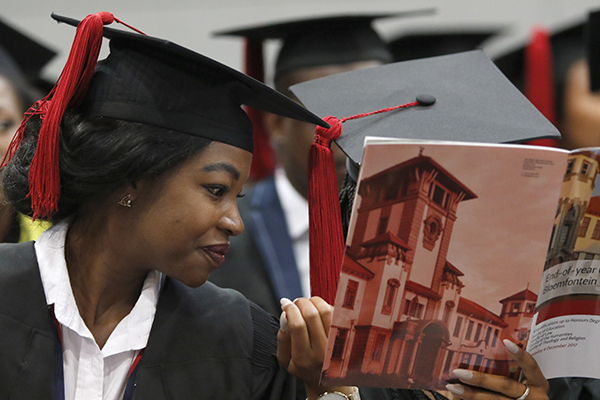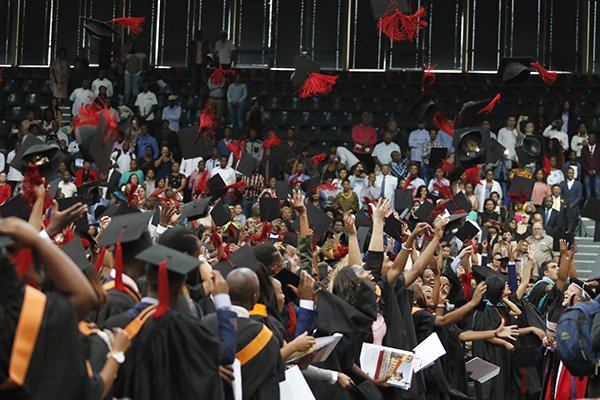
Photo: Johan Roux
Graduation videos
Photo galleries
6 December: Morning
6 December: Afternoon
7 December: Morning
7 December: Afternoon
A total number of 1 226 qualifications, including diplomas, certificates, and degrees, were conferred during the two days of the 2017 End-of-Year Graduation Ceremony which took place on the Bloemfontein Campus of the University of the Free State (UFS). Forty doctorates and 109 master’s degrees were awarded. Most doctorates (19) were awarded in the Faculty of Natural and Agricultural Sciences which also conferred the biggest number of master’s degrees (27).
Celebrating excellence
Some of the highlights at this year’s graduation ceremonies were when the university honoured Prof Paul Holloway and Marius Botha with honorary doctorates and Joyene Isaacs with the Chancellor’s Medal.
Isaacs, Head of the Department of Agriculture in the Western Cape, who was nominated by the Centre for Sustainable Agriculture in the Faculty of Natural and Agricultural Sciences for the Chancellor’s Medal, said: “Agriculture is one of those areas people take for granted. With this medal, agriculture can come to the fore. Agriculture is placed in the spotlight and it is important for this country, but also globally, because we look after the food supply. For me agriculture has been a sustainable livelihood but also a career. Everything about agriculture excites me! I hope that through this award I can take agriculture to the next level.”
Prof Holloway, internationally acclaimed expert in the science and technology of surfaces, thin films, and nanoparticles, who received the Honorary Doctorate in Science degree, said: “This award recognises the efforts we (the UFS and the University of Florida in the US) have jointly developed. We introduced the UFS to phosphors and today it (the UFS) has world-wide recognition expertise in this field. We also learnt from them. They brought us technology we did not have before. It was a mutual growth technique and we all benefit from that. If you work together you can achieve remarkable things.”
“It is the greatest honour of my life. I’ve been associated with the UFS for 17 years in the capacity of moderator, examiner and sometimes lecturer.” These were the words of Botha, author and expert in the financial planning circles of South Africa who was nominated for an honorary degree by the School of Financial Planning Law.
Botha told graduates that a qualification in the financial planning field would give you many opportunities. “If you enter almost any financial services organisation in South Africa, you will find senior people there that completed the postgraduate diploma in Financial Planning Law at the UFS,” he said.
During a luncheon that was hosted by Prof Francis Petersen, the UFS Rector and Vice-Chancellor, in honour of these esteemed graduates, he thanked them for the contribution they had made, not only for the UFS, but for advancing science, technology, and the better of society. “The Honorary degrees and Chancellor’s Medal are the highest accolades and recognition that the university can bestow on individuals who have excelled in science or scholarship or have contributed to service to this country. You are exemplary individuals and you make the UFS, our country and the world proud,” he said.

Photo: Johan Roux
Inspiration for the future
Likeleli Monyamane, a UFS Council member, addressed graduates during the morning ceremony on 6 December 2017. She motivated graduates to walk tall and learn to serve our country. “Finding your voice comes with a responsibility to speak for those who do not have a voice,” Monyamane said.
Leah Molatseli, who launched South Africa’s first legal e-commerce website, Lenoma Legal, was the guest speaker at the afternoon session on 6 December 2017. “You are going to start afresh. It is going to feel like you know absolutely nothing and it’s ok. You need to make peace with that in order for you to learn.
“A lot of young people expect instant success when they enter a job. I am 29 and have had three jobs, two side jobs and numerous certificates. But I decided to create my own future. That is what I did with Lenoma Legal. Some people are meant to be ordinary and some extraordinary,” said this young entrepreneur and Kovsie Alumnus.
On the second day of the graduation ceremonies Dr Imtiaz Sooliman, founder and Director of the Gift of the Givers Foundation, challenged the newly graduated alumni to be carriers of hope for Africa. “We need people of skill, spirituality and heart,” he said.
“How do you want others to believe in you if you don’t believe in yourself? We South Africans, we can make things happen. Believe in yourself,” he said.
“The best science you can do is for others. The moment you achieve that, you mean something to someone,” he said.
Prior to dissolving the congregations, Dr Khotso Mokhele, the Chancellor of the UFS, said: “It has taken hard work, commitment, dedication, to walk across the stage. You deserve all of that.”
Interesting facts of the graduation
Among the graduates at these ceremonies was former Miss World 2014, Rolene Strauss. She received a Bachelor of Medicine and Bachelor of Surgery Degree.
The Faculty of Natural and Agricultural Sciences is also very proud of the first group of BAgric students who graduated on the Agricultural College Programme. The eight agriculture students all received the Bachelor of Agriculture degree, majoring in Agricultural Management.